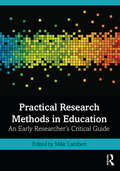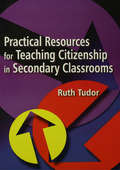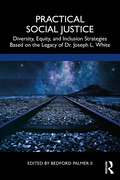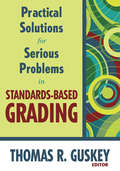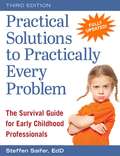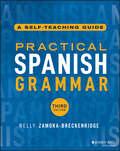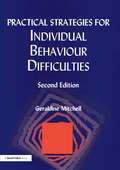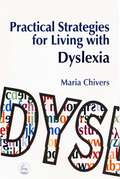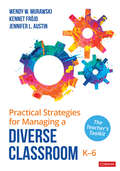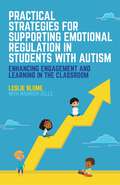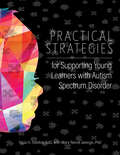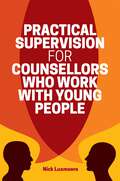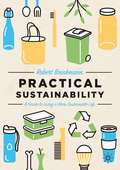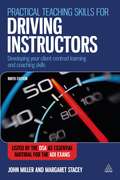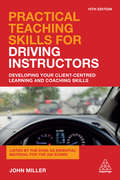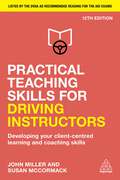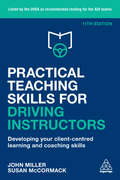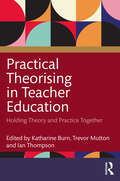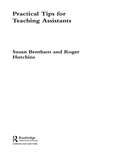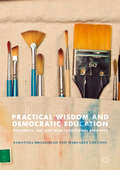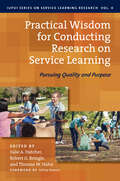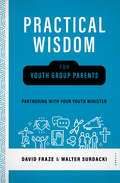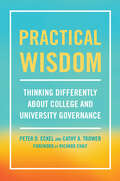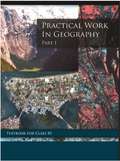- Table View
- List View
Practical Research Methods in Education: An Early Researcher's Critical Guide
by Mike LambertPractical Research Methods in Education is a hands-on guide which critically explores and scrutinizes research methods used in educational enquiry. Drawing on the research, practical experience and reflections of active researchers, each chapter offers explanations, examples, tasks for students to undertake and suggestions for further reading, all of which are designed to strengthen understanding of practical methods of data collection in educational and social-science research. This insightful book offers: Detailed illustration of a range of data-collection methods and approaches used in educational research Chapters written by active researchers, experienced in addressing challenges of carrying out practical research in education Examples, study tasks and suggestions for further reading in each chapter An exploration of critical reflection and decision-making in relation to research methodology in education Close attention to research ethics Exploring practical methods of data-collection for educational and social-science research, Practical Research Methods in Education is a unique and valuable resource for any students interested and engaged in the planning and completion of their own investigations.
Practical Resources for Teaching Citizenship in Secondary Classrooms
by Ruth TudorBased on the New Curriculum for Citizenship, this book provides practitioners in secondary schools with the essential tools needed to teach citizenship. The authors provide an overview of the citizenship order and give guidance on how to fulfill its three main elements: social and moral responsibility, community involvement and political literacy. The book focuses on curriculum developments, teaching, learning and assessment issues and includes a rationale for planning schemes of work in citizenship for the whole school. It also includes lesson plans, teaching ideas and resources, and step-by-step guidance on assessment. Emphasis is placed on including all pupils and references are made to cross-curricular links with other subjects.
Practical Social Justice: Diversity, Equity, and Inclusion Strategies Based on the Legacy of Dr. Joseph L. White
by Bedford Palmer IIPractical Social Justice brings together the mentorship experiences of a diverse group of leaders across business, academia, and the public sector. They relay the lessons they learned from Dr. Joseph L. White through personal narratives, providing a critical analysis of their experience, and share their best practices and recommendations for those who want to truly live up to their potential as leaders and mentors. As one of the founding members of the Association of Black Psychologists, the Equal Opportunity Program, and the ‘Freedom Train’ this book focuses on celebrating Dr. White’s legacy, and translating real world experience in promoting social justice change. Experiential narratives from contributors offer a framework for both the mentee and the mentor, and readers will learn how to develop people and infrastructure strategically to build a sustainable legacy of social justice change. They will be presented with ways to pragmatically focus social justice efforts, favoring results over ego. This is a unique and highly accessible book that will be useful across disciplines and generations, in which the authors illustrate how to build relationships, inspire buy-in, and develop mutually beneficial partnerships that move people and systems towards a more equitable, inclusive, and just future. Providing a personal guide to developing an infrastructure for institutional change, Practical Social Justice is based on over half a century of triumph, translated through the lenses of leaders who have used these lessons to measurable and repeatable success. This book will be essential reading for undergraduate and graduate students in the fields of Psychology, Social Work, Ethnic Studies, Sociology, Public Policy, Leadership, Communications, Business, and Educational Administration. It is also important reading for professionals including leaders and policy makers in organisations dealing with issues around diversity, equity, and inclusion, and anyone interested in promoting social justice.
Practical Solutions for Serious Problems in Standards-Based Grading
by Thomas R. GuskeyImplement standards-based grading practices that accurately and equitably report student achievement! Standards-based education poses a variety of challenges for grading and reporting practices. This edited volume examines critical issues in standards-based grading and provides specific suggestions for improving policies and practices at the school and classroom levels. The chapters: Describe traditional school practices that inhibit the implementation of standards-based grading Address how teachers can assign fair and accurate grades to English language learners and students with special needs Examine legal issues related to grading Discuss why report card grades and large-scale assessment scores may vary Offer communication strategies with parents
Practical Solutions to Practically Every Problem: The Survival Guide for Early Childhood Professionals
by Steffen SaiferAn encyclopedic how-to guide for the universal early childhood program problems.Practical Solutions to Practically Every Problem attempts to provide solutions to every possible problem faced by early childhood teachers-before teachers encounter them. This classic resource has been updated to focus on current issues faced by educators, including teaching twenty-first century life skills, technology, and cultural responsiveness. This easy-to-use guide gives you quick practical help, now!Educators will save time and energy with over eight hundred solutions to two hundred problems, including:Daily dilemmas and classroom issuesPartnering with families to raise happy childrenDealing with problematic behaviors from co-workersLearning to take care of yourself to prevent burn-outSteffen Saifer, EdD, a former early childhood teacher and Head Start director and trainer, is currently an international consultant and writer based in Spain. He has worked on projects for the Open Society Foundation, The World Bank, and UNICEF, in many countries including Bangladesh, Russia, and Zimbabwe. Dr. Saifer works with programs on culturally responsive curriculum development and implementation and with universities to develop graduate programs for ECD teachers, administrators, and leaders. When in the United States, Saifer resides in Portland, Oregon
Practical Spanish Grammar: A Self-Teaching Guide
by Nelly Zamora-BreckenridgeLearn Spanish, as easy as uno, dos, tres! Practical Spanish Grammar, Third Edition, combines the quick-reference virtues of a phrase book with the learning tools of a full-fledged language course. This popular resource has been completely updated and revised for today's Spanish usage so you can be confident that you're not just learning “textbook Spanish.” Students, jobseekers, and travelers can boost their practical language skills with this self-paced guide. Why this book? There are many resources online and off that you can use to practice Spanish. All practice is valuable, but when you have a question, you need an authoritative reference that you can turn to for trusted answers. And, when it comes to building your foundational knowledge of Spanish grammar and phrases, there's still no substitute for working through a proven textbook like Practical Spanish Grammar. Written by a professor who taught the Spanish language for more than 30 years, this concise, practical, and easy to follow book helps you easily find the content you need to improve your Spanish skills. Follow a proven, interactive approach for teaching yourself at your own pace Complete exercises to reinforce what you learn and get answers in the book Get clear explanations of Spanish grammar Learn more than 1,000 of the most frequently used Spanish words Practice sample dialogues with cultural notes and lists of terms Beginner and intermediate students of the Spanish language will make great progress with Practical Spanish Grammar. Excellent as a textbook and as a self-study guide, this book is a must for Spanish learners.
Practical Strategies for Individual Behaviour Difficulties
by Geraldine MitchellPrimary and secondary teachers who experience difficult behaviour from young children in their classrooms will welcome this handbook which encourages an objective approach to tackling behaviour problems.
Practical Strategies for Living with Dyslexia
by Maria Chivers'This little book does exactly what it sets out to do. It spells out all you need to know about different methods and strategies for treating dyslexia. So, if you want to know more about the many approaches to helping someone with dyslexia, then read this book. At the end of the day, you will be better informed to choose a way to suit your child. It is encouraging to read her list of famous people with dyslexia. It includes Hans Christian Anderson, Albert Einstein, Winston Churchill, Agatha Christie, Jeremy Irons, Jackie Stewart and Richard Branson. They haven't done too badly, have they?' - www.family2000.org.uk 'This readable and useful little book has been written by a mother of two dyslexic sons. She writes about the hard road she travelled to find help and support for them. The book covers most of the questions that the parents of a dyslexic child would want answered, but it is just as useful to professionals who have a dyslexic child in their classroom or setting. The importance of early identification is stressed and the author provides useful information about tests which can be administered to children as young as four years old. There are informative chapters about the various successful techniques and strategies for working with dyslexic children, ranging from the well-publicised rose-coloured spectacles to the part played by a special diet.' - Nursery World Over the years, many quick fix approaches to cure dyslexia have been developed and used. These 'miracle cures' have offered hope to many parents who are left disillusioned by the school system and health service. With no other way to turn, many parents spend more and more money on special glasses, vitamins, exercises and specialist advice, but do they actually work? Written by a parent of two dyslexic sons, who herself searched for anything that would 'cure' them, this new book is a practical guide to dyslexia's many 'miracle cures'. Practical Strategies for Living with Dyslexia suggests that early identification of this condition may be the key. Dyslexia is often not diagnosed until children have started school, yet testing is now available from the age of four-and-a-half. On top of this many dyslexics also have eye and ear problems that go undetected, which further exacerbates the problem. Looking at the possible remedies available, such as tinted glasses, nutritional supplements and exercising, and considering the benefits of early identification of dyslexia, this book will be an essential practical resource for both the parents of, and the professionals who work, with people with dyslexia.
Practical Strategies for Managing a Diverse Classroom, K-6: The Teacher′s Toolkit
by Jennifer Austin Wendy Murawski Kennet FröjdYour Teacher Toolkit for Better Teaching and Learning Every educator needs a toolkit of strategies to ensure that students of different abilities, backgrounds, and learning profiles achieve success in the classroom. Rather than requiring busy educators to read copious amounts of research and theory first, Practical Strategies for Managing a Diverse Classroom flips the script, providing the answers and tools you need up-front so you can implement them immediately. Inside, you′ll find: Powerful vignettes and common scenarios found in any inclusive classroom Concrete strategies for each classroom scenario Research and evidence for each strategy, explaining how and why it works An exploration of cutting-edge topics such as co-teaching, cooperative learning, applied behavior analysis, SEL, and more Additional resources, applications, and activities for book studies or for educators who want to go deeper into the topics that appeal to them the most Written by a team of experienced educators with varied backgrounds, Practical Strategies for Managing a Diverse Classroom offers practical strategies for effective teaching and learning, better classroom management, and strengthened student engagement.
Practical Strategies for Managing a Diverse Classroom, K-6: The Teacher′s Toolkit
by Jennifer Austin Wendy Murawski Kennet FröjdYour Teacher Toolkit for Better Teaching and Learning Every educator needs a toolkit of strategies to ensure that students of different abilities, backgrounds, and learning profiles achieve success in the classroom. Rather than requiring busy educators to read copious amounts of research and theory first, Practical Strategies for Managing a Diverse Classroom flips the script, providing the answers and tools you need up-front so you can implement them immediately. Inside, you′ll find: Powerful vignettes and common scenarios found in any inclusive classroom Concrete strategies for each classroom scenario Research and evidence for each strategy, explaining how and why it works An exploration of cutting-edge topics such as co-teaching, cooperative learning, applied behavior analysis, SEL, and more Additional resources, applications, and activities for book studies or for educators who want to go deeper into the topics that appeal to them the most Written by a team of experienced educators with varied backgrounds, Practical Strategies for Managing a Diverse Classroom offers practical strategies for effective teaching and learning, better classroom management, and strengthened student engagement.
Practical Strategies for Supporting Emotional Regulation in Students with Autism: Enhancing Engagement And Learning In The Classroom
by Leslie Blome Maureen ZelleFor professionals who work with students on the autism spectrum in inclusive classroom settings, supporting emotional regulation is key. This practical guide outlines cognitive and language strategies that support emotional regulation, which the authors have found successful with their students with autism, supported by research that shows why they work. The focus in this book is on the emotional state of the child as opposed to controlling behaviours. The guidelines and strategies provided help students with prediction and make the expectations of them clear, empowering children by giving them choices. Examples of how to use each strategy are given, alongside tips for application. The book also includes sample goals for regulation, information on therapy techniques that work and a 'cheat sheet' overview of the strategies, creating a clear and concise guide to engaging and enhancing learning in the classroom.
Practical Strategies for Supporting Young Learners with Autism Spectrum Disorder
by Mary Jalongo Edd Tricia SheltonThe prevalance of autism spectrum disorder (ASD) is growing tremendously in early childhood classrooms. To support students with ASD, educators can draw on strategies that incorporate best practices as well as recognize individual strengths and needs. Practical Strategies for Supporting Young Learners with Autism Spectrum Disorder showcases the diverse capabilities of students with ASD and prepares early childhood educators to work effectively with students ages 3-5 with pervasive developmental disorders (PDD). Descriptive examples and interactive activities guide teachers to understand how these disorders affect student progress and how educators can tap into student potential. Each chapter offers several strategies to address specific academic, social, and behavioral needs common to many young children with ASD. The strategies are easy to follow and accompanied by teacher tips, sample resources, and relevant student goals.
Practical Supervision for Counsellors Who Work with Young People
by Nick LuxmooreCounsellors working with young people often find it can feel like messy, complex work. What helps when counsellors are stuck? This book recalls those moments when supervision sessions have been crucial to puzzling out the complexities of counselling young people. The assorted supervision stories in this book explore the important issues that counsellors working with young people face, and looks at how supervision can help them overcome these issues. Thoughtful and engaging, each story is a snapshot from a counsellor's career. They address questions such as 'What gets talked about?', 'What issues recur with young people and how are they addressed in supervision?' and 'What helps counsellors to move on when they're stuck?' As a veteran counsellor and supervisor with 40 years' experience, Nick Luxmoore vividly recounts moments of highs and lows, of uncertainties and of breakthroughs, and of the unique dilemmas experienced by counsellors and supervisors working with young people.
Practical Sustainability: A Guide to a More Sustainable Life
by Robert BrinkmannThis book will teach you everything you need to know about sustainable living—from reducing your greenhouse gas footprint to making sure that you are part of the green economy. Along the way, readers will learn about the field of sustainability and the “three E’s” of sustainable living—environment, economy, and equity. We are in the midst of great environmental change and all of us need to do everything we can to try to live more gently on the planet. Robert Brinkmann provides a range of options for readers as to what they can do to try to make a difference. Some involve simple lifestyle changes - but he also challenges all of us to commit to make more difficult and more meaningful changes to create a greener, more sustainable world. The book also delves into how we can create more sustainable communities, schools, and organizations. It showcases many examples of people and organizations that are making significant contributions to improving our planet’s sustainability that serve as inspiration and guidance for all of us trying to live more sustainably.
Practical Teaching Skills for Driving Instructors
by John Miller Margaret StaceyWritten for both existing and trainee driving instructors, Practical Teaching Skills for Driving Instructors shows how to develop and improve the ability to teach driving as a lifetime skill. The companion title to the popular best-seller The Driving Instructor's Handbook, it offers advice on teaching, communication and coaching skills. Fully revised, it investigates how and why people learn and the different teaching and learning processes involved. With sections on structuring a lesson and problem solving, it also looks at the reasons why people learn to drive and the motivation involved in seeing it through, from early stage lessons to the final practical test. Listed by the DSA as essential reading for the ADI exams, it is an indispensable guide for all new and established driving instructors, providing all the necessary advice for the conscientious instructor keen to communicate effectively with their pupils.
Practical Teaching Skills for Driving Instructors: Developing Your Client-Centred Learning and Coaching Skills
by John MillerListed by the DSA as essential reading for the ADI exams, Practical Teaching Skills for Driving Instructors is an indispensable guide for all new and established driving instructors. Fully revised to cover all changes to the ADI exams in 2016/17, it also provides all the necessary advice for the conscientious instructor keen to communicate effectively with their pupils.Containing essential guidance on teaching, communication and coaching skills, Practical Teaching Skills for Driving Instructors is ideal for both existing and trainee driving instructors. It investigates how and why people learn and the different teaching and learning processes that are involved. With sections on structuring lessons and problem solving, it covers the whole teaching process, from early stage lessons to the final practical test. The companion title to the popular best-seller, The Driving Instructor's Handbook, this is your practical guide to developing and improving your ability to teach driving as a lifetime skill.
Practical Teaching Skills for Driving Instructors: Developing Your Client-Centred Learning and Coaching Skills
by John Miller Susan McCormackImprove your teaching and communication skills with this guide which is recommended reading by the Driver and Vehicle Standards Agency (DVSA) for the Approved Driving Instructor (ADI) examinations. Practical Teaching Skills for Driving Instructors is an indispensable handbook for all new and established driving instructors. Fully revised and updated for this 12th edition, it provides all the necessary advice to help driving instructors and anyone involved in driver training to communicate effectively with learners. Containing essential guidance on teaching, communication and coaching skills, Practical Teaching Skills for Driving Instructors is ideal for both experienced and trainee driving instructors. It explains how people learn and how to tailor the teaching approach to different needs. With sections on how structuring lessons, it covers the whole teaching process, from early stage lessons through to the final test. The companion title to the bestselling The Driving Instructor's Handbook, it will help you develop and improve your ability to teach drivers how to drive.
Practical Teaching Skills for Driving Instructors: Developing Your Client-Centred Learning and Coaching Skills (Driving Ser.)
by John Miller Susan McCormackEssential reading for the ADI exams, Practical Teaching Skills for Driving Instructors is an indispensable guide for all new and established driving instructors. Fully revised and updated for this 11th edition, it also provides all the necessary advice for the conscientious instructor keen to communicate effectively with their learners.Containing essential guidance on teaching, communication and coaching skills, Practical Teaching Skills for Driving Instructors is ideal for both existing and trainee driving instructors. It investigates how and why people learn, and the different teaching and learning processes that are involved. With sections on structuring lessons and problem solving, it covers the whole teaching process, from early stage lessons to the final practical test. The companion title to the popular best-seller, The Driving Instructor's Handbook, this is your practical guide to developing and improving your ability to teach driving as a lifetime skill.
Practical Theorising in Teacher Education: Holding Theory and Practice Together
by Ian Thompson Katharine Burn Trevor MuttonThis insightful collection offers a timely contribution to the body of research on practical theorising in teacher education. Acknowledging the importance of experience and reflective practice in teaching, this book simultaneously embraces the essential need for teachers at all career stages to engage effectively and critically with evidence from research. Drawing together a range of perspectives from university-based and school-based teacher educators, this book examines the challenges and critiques advanced when practical theorising was first proposed, as well as recent tensions created by the performative culture that now pervades education. It illustrates the constant renegotiation and renewal necessary to sustain such an approach to beginners’ learning, investigating a range of tools developed by teacher educators to help beginning teachers navigate these demands. Demonstrating the value of practical theorising and therefore promoting powerful professional learning for practitioners, this book is essential for teachers at all career stages, including trainee teachers and student teachers.
Practical Tips for Teaching Assistants
by Susan Bentham Roger HutchinsPacked full of practical suggestions, tips, advice and up-to-date factual information, this book provides a trouble-shooting guide to help teaching assistants deal with a wide variety of classroom situations. Issues and dilemmas confronted in the book include: who’s who in the school self esteem how to use individual learning styles to support students and those with special needs dealing with unacceptable behaviour coping with the job and personal development. Whether read from cover to cover or used as a quick reference tool for looking up specific concerns, this is an essential book for all teaching assistants in primary, secondary and special needs schools, those starting out, and teaching assistants enrolled on training programmes such as NVQ 2, NVQ 3 and the higher level teaching assistant's award.
Practical Wisdom and Democratic Education: Phronesis, Art And Non-traditional Students
by Samantha Broadhead Margaret GregsonThis book explores the development of practical wisdom, or phronesis, within the stories of four mature students studying for degrees in art and design. Through an analysis informed by the ideas of Basil Bernstein and Aristotle, the authors propose that phronesis – or the ability to deliberate well – should be an intrinsic part of a democratic education. As a number of vocational and academic disciplines require deliberation and the ability to draw on knowledge, character and experience, it is essential that no student feels their experience puts them at a disadvantage. The authors argue that democratic education should allow each participant to feel enhanced, included and able to participate in order to create a constructive and reciprocal dialogue. This work will be of value to students and scholars interested in democratic education, the experiences of non-traditional students, and the sociology of education.
Practical Wisdom for Conducting Research on Service Learning: Pursuing Quality and Purpose
by Robert G. Bringle Julie A. Hatcher Thomas W. HahnFor scholars seeking to undertake consequential research in service-learning and community engagement (SLCE) at a time when there is widening interest in and increasing acceptance of research in this field as a primary area of scholarship, this book provides accounts by preeminent scholars about the trajectories of their research, their methodologies, lessons learned along the way, as well as their views about the future direction of the field.The contributors to this volume represent a range of disciplines and fields including education, history, organizational leadership, political science, philanthropic studies, psychology, and public health, as well as both qualitative and quantitative traditions, and offer models of scholarly learning that contribute to a knowledge base that can guide practice and further the broader public purposes of the academy.They articulate how they view their research on SLCE as having broader purposes that matter to them personally as well as professionally and illustrate how the “why” and “to what end” of their research can evolve as a program of research develops and matures across time. They identify key choices they made in terms of inquiry and methodology, describe both successes and challenges in establishing and navigating a SLCE research agenda across their careers, and share lessons learned from their research journey to advance the field both domestically and abroad. Emerging from these narratives is a theme of practical wisdom that arises through the learning of researchers, students and communities as they engage with complex social contexts.
Practical Wisdom for Youth Group Parents: Raising and Saving your Teen is not just your Youth Minister's job
by Dr David Fraze Dr Walter SurdackiA Youth group is not only about your teenager.Youth ministry, done well, includes and impacts the entire family. Practical Wisdom for Parents is not a book about how to make your teens sit down and have a family devotional. Instead, this book will help you and your teen thrive and flourish during these important years.David and Walter give numerous practical suggestions on how you can work alongside and support those leading your youth ministry, including a variety of ways you can support and be involved in your teen’s youth ministry experience. Many of their ideas are “behind the scenes” that don’t require you to teach a class or lead a devotional. However, your partnership role with your youth ministry leadership will be clearly articulated throughout.
Practical Wisdom: Thinking Differently About College and University Governance
by Cathy A. Trower Peter D. EckelCo-published with This series of essays written for trustees and administrative leaders of universities and colleges draws on the authors’ extensive consulting experience, research into the dynamics of boards, and service as trustees, to focus on practical insights that will help readers improve governance. The authors have contributed a series of essays on governing well to Inside Higher Education, which formed the inspiration for this volume.The primary aim of the book is to provide insight that boards can use to enhance their governing practices. The author’s take is not a “how to do” book but rather one on “how to think.” Their basic premise is that too many boards are underperforming because they adopt or continue ineffective practices. However, thinking in more intentional if not new ways about not only what they do as boards, but how they go about their efforts, will help boards add value to the institutions and state systems they govern. The authors use thought provoking-titles and a conversational tone to engage the readers, get them to reflect on their work, and broaden their horizons.
Practical Work In Geography Part 1 class 11 - NCERT
by National Council of Educational Research and TrainingThis edition of Practical Work in Geography Part – 1 has been published by the National Council of Education Research and Training. It will be an ideal tool for the students of class 11 to learn the intricacies of Geography. It has been enriched with content that is written in lucid language so that the students can have a firm idea about the basic concepts of Geography. It also adheres to the latest syllabus and guidelines that have been set by the CBSE.
